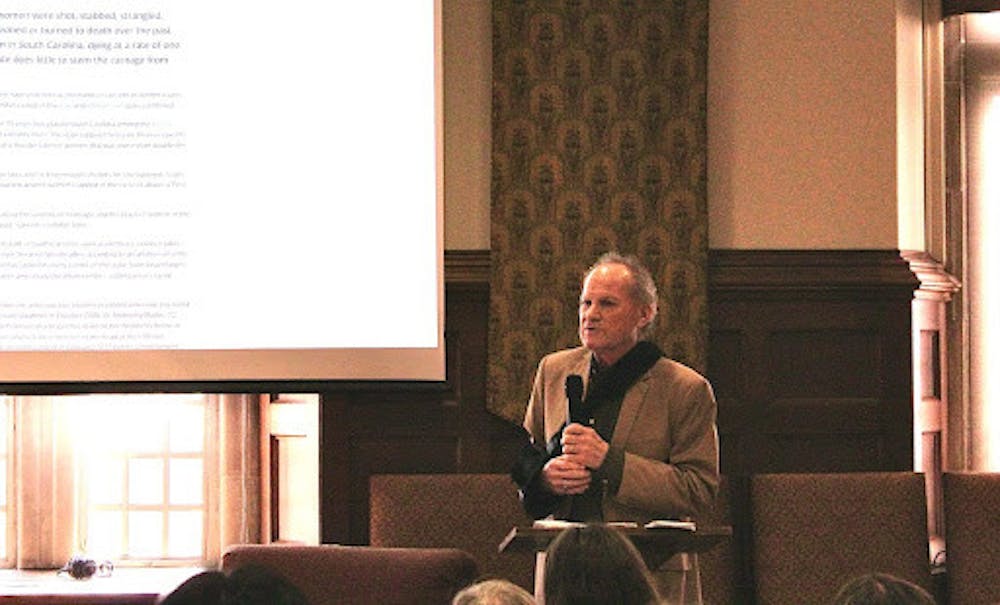Pulitzer Prize-winning investigative reporter Doug Pardue met with students at the University of Richmond to speak about the critical role of investigative journalism on Feb. 26.
Thomas Kapsidelis, visiting assistant professor of journalism and a former colleague of Pardue, introduced him at the event. The talk focused on the importance of saving journalism, a profession Pardue described as politically and economically under attack.
Pardue began with a story of how he got his start in investigative reporting, sharing how, as a police and court reporter, he was assigned to cover a woman who had frozen to death in her rented house a few blocks from City Hall in Roanoke, Virginia.
Pardue began investigating and unveiled major discrepancies in the city’s housing.
“I was shocked. I was angry. I was pissed off at my city,” Pardue said. “How could they have a house for rent that was so ill-equipped that a person could freeze to death in our city?” Pardue’s story about the woman became the first major investigative story in a multi-part series which resulted in changes in the city's housing and rules for which houses can be rented.
This was the first story in Pardue’s career that created a real impact on a local level, something that he emphasized throughout his talk. The changes he was able to make through his reporting propelled Pardue into a career dedicated to making an impact.
“Once we show the power of industry and its influence on the legislature, we're able to make changes in the laws,” Pardue said .
He shared more anecdotes of his experience in investigative reporting and the ways that his stories were able to make changes across communities.
While working for The Roanoke Times, Pardue was a key reporter covering the United Mine Workers strike against the Pittston Coal Group, a story that was a 1990 Pulitzer finalist in general news reporting.
One of the biggest stories of Pardue’s 47-year career came toward the end of it.
While working as the first investigations editor for The Post and Courier in Charleston, South Carolina, Pardue received a press release about domestic violence, in which South Carolina was found to be the most dangerous state in the nation for women.
Pardue was the lead reporter of a team of four that explored how South Carolina had obtained such ranking. He shared that in their research, they found that violence against domestic animals carried a higher prison sentence in the state than violence against a man’s wife did.
Enjoy what you're reading?
Signup for our newsletter
“That story took a year to report and write, and [then] we changed the laws in South Carolina,” Pardue said.“State began to talk about trying to put classes in schools and health care to try to make people better understand the way to treat people.”
In 2015, the investigative series, “Til Death Do Us Part”, won the Pulitzer Prize for Public Service, and was described by a judge as a “riveting series.”
Pardue concluded his talk by emphasizing how journalism has always been a necessary power to protect our democracy and is now more important than ever.
“The power now falls to you young people,” Pardue said.
Pardue also answered questions about the future of journalism, his career and his advice for aspiring journalists.
First-year Lucy Johnson appreciated Pardue’s emphasis on using journalism to make an impact and get people to listen.
When asked to give advice about reporting and conducting interviews, Pardue shared his best advice:
“Be truly interested in their story and shut up. Let people talk,” Pardue said.
“Journalism is largely a job of individuals, individuals with curiosity, individuals trying to inform, trying to expose problems, and of asking how come?”
Contact lifestyle writer Sophie Dulog at sophie.dulog@richmond.edu.
Support independent student media
You can make a tax-deductible donation by clicking the button below, which takes you to our secure PayPal account. The page is set up to receive contributions in whatever amount you designate. We look forward to using the money we raise to further our mission of providing honest and accurate information to students, faculty, staff, alumni and others in the general public.
Donate Now



